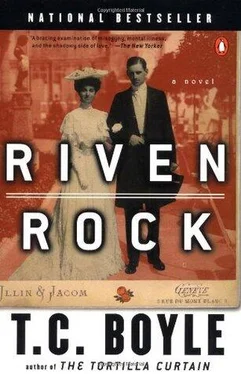T. Boyle - Riven Rock
Здесь есть возможность читать онлайн «T. Boyle - Riven Rock» весь текст электронной книги совершенно бесплатно (целиком полную версию без сокращений). В некоторых случаях можно слушать аудио, скачать через торрент в формате fb2 и присутствует краткое содержание. Год выпуска: 1999, Издательство: Penguin Books, Жанр: Современная проза, на английском языке. Описание произведения, (предисловие) а так же отзывы посетителей доступны на портале библиотеки ЛибКат.
- Название:Riven Rock
- Автор:
- Издательство:Penguin Books
- Жанр:
- Год:1999
- ISBN:нет данных
- Рейтинг книги:5 / 5. Голосов: 1
-
Избранное:Добавить в избранное
- Отзывы:
-
Ваша оценка:
- 100
- 1
- 2
- 3
- 4
- 5
Riven Rock: краткое содержание, описание и аннотация
Предлагаем к чтению аннотацию, описание, краткое содержание или предисловие (зависит от того, что написал сам автор книги «Riven Rock»). Если вы не нашли необходимую информацию о книге — напишите в комментариях, мы постараемся отыскать её.
Riven Rock — читать онлайн бесплатно полную книгу (весь текст) целиком
Ниже представлен текст книги, разбитый по страницам. Система сохранения места последней прочитанной страницы, позволяет с удобством читать онлайн бесплатно книгу «Riven Rock», без необходимости каждый раз заново искать на чём Вы остановились. Поставьте закладку, и сможете в любой момент перейти на страницу, на которой закончили чтение.
Интервал:
Закладка:
Carrie looked her full in the face. She pursed her lips and made a tsking sound. “After two years in the Movement, I should think you’d be used to it — you’ve seen what they’ve written about me. But take the paper in the other room and find yourself a quiet nook — read it. All the way through. Really, there’s nothing but praise for you in there. And don’t let the headlines upset you — they’re made to be intentionally insipid and tasteless. That’s how they sell newspapers.”
Yes, but she’d wanted to keep the Dexter name out of it — and Stanley’s too. And her own deepest hopes and pains, her marriage, her suffering — how dare they? How dare they print a word about her private life? They could howl “No to Petticoat Rule” all they wanted — that was part of the privilege of living in a democracy, no matter how wrongheaded it was — but there were certain things that had to be held sacrosanct.
“Go on,” Carrie urged, maternal herself now, Mrs. Littlejohn clucking away in harmony, every doily on every table aglow with solicitude, “read it. It makes you out to be a saint, Kat, it does — and it’s publicity, good publicity that people can’t help linking with our cause.”
Katherine couldn’t believe what she was hearing. Carrie Chapman Catt, the woman she admired above all others, admired to the point of worship even, she who had founded the National Woman Suffrage Association and demanded of her amenable second husband (now amenably deceased) four months of absolute freedom a year and the money to campaign for the vote in the manner to which she was accustomed, was willing to offer her up to the canaille for mere publicity. Katherine was stung. And in that moment she didn’t know what was worse, her dirty laundry aired in public by a bunch of ink-stained hacks or her idol’s cold streak of realpolitik. She set her jaw. Stood. And without a word to either woman stalked out of the room and up the stairs to the bedroom Mrs. Littlejohn had provided for her and Carrie during their campaign amongst the Fourth of July revelers on Nantasket Beach.
The house was near Hull and it looked out on Hingham Bay, the bay that gave onto the serious ocean, the true ocean, the cold somber Atlantic, and there were no palms here, no zephyrs, no parrots or monkeys or orange trees or anything else that smacked of frivolity or sensuality. Katherine settled into an armchair by the window and read through the article as if she were gulping water after three sets of tennis:
It is not a case of lovers separated in death, but rather a separation in life, to overcome which if it were possible millions would be no barrier. In this case it is not a hero but a heroine who furnishes the lesson in constancy, and her most intimate acquaintances, those of the smartest set in New York, in Boston and Chicago, bow to her with admiration that is born of respect.
The heroine is the beautiful, intellectual and highly-accomplished Mrs. Katherine Dexter McCormick, the young wife of Stanley McCormick, whose father was the brains behind the gigantic harvester corporation, an institution whose wealth no one could accurately estimate.
Stanley McCormick is insane, suffering from a form of dementia. He lives in California, where a mansion in the exclusive city of Montecito, which is populated by a colony of retired millionaires, is maintained for him.
The letters fled like ants across the page, accumulated into big black staring words with heads and pincers and then sentences that bit and stung and made her flesh crawl, beautiful, intellectual, highly-accomplished, insane: how dare they? How dare they? And then, farther on down the page, all wounds became one wound:
Dr. Hamilton does not allow her to see her husband, much less converse with him. And yet, nothing daunted, Mrs. McCormick goes to Montecito in December of each year and spends the Yule-tide season near the man she loves.
Stanley McCormick does not know that his wife visits in the vicinity. This his wife knows and though she would give her life to be of benefit to him she sadly turns from the sanatorium and soothes herself with solitary walks on the grounds.
The mansion is surrounded by a garden that is beautiful to behold. It has been referred to as a veritable Garden of Eden with its tropical foliage, palms, long winding driveways and miniature forests. In this garden Mrs. McCormick forgets as she roams, listening to the song birds, viewing with keen interest a small menagerie maintained by Dr. Hamilton in which many specimens of the monkey tribe predominate. There is a scientific reason for this menagerie, but this is known only to scientists.
She wanted to tear the paper to pieces and fling it from her, but she didn‘t, she couldn’t, and though she tried not to think of Stanley — her Stanley, nobody’s but hers, not his mother’s or his sisters’ or his brothers‘, not anymore — though she’d thrown herself body and soul into the suffrage movement as a way of forgetting, here it was all over again, all her private pain, and served up to titillate the great unwashed in their linoleum kitchens. What would her mother think? And her father — he must be turning over in his grave.
Hope is gone, indeed. How would they know? They’d snooped and prodded and poked around enough to hear word of the hominoid colony, and yet they couldn’t begin to fathom its purpose or the hope it represented. This was obscene. Irresponsible. Yellow journalism at its worst. And whom had they been talking to? Hamilton, certainly. Some of the staff — O‘Kane? Nick? She remembered giving an interview herself, one of dozens connected with her work for Carrie and NAWSA, but she never dreamed they’d pry into her personal life as if she were an Evelyn Nesbit or Sarah Bernhardt or some such person. And they were wrong — hope was very much alive, even if it was dampened by the steady drizzle of the years. She hadn’t seen Stanley face to face in more than five years now, since he was at McLean, and he’d gotten so much worse before his recent improvement, what with his escape through the louvers and his descent all the way back into the darkness, so far back it was as if he’d been entombed all this time, but there was hope, there was. His nurses had taught him to walk again and to eat and he was lucid sometimes now, or so they told her… and science, science was making leaps all the time, what with glandular research and psychotherapy, with Freud, Jung, Adler. There was hope, abundant hope, and she would never give way to despair — and why didn’t they print that?
She’d been sitting there for some minutes, the paper in her lap, the bay beyond the windows scoured by tight bands of cloud that were like steel springs coiling and uncoiling over the steely plane of the water, the voices of the women in the parlor below drifting up to her in snatches. And then she looked down at the story again, the story about her, the beautiful and intellectual Katherine Dexter McCormick, and settled on the last paragraph, the one that canonized her:
One of Mrs. McCormick’s friends the other day said:
“Such a character as that woman possesses is an object lesson for the world. It would seem to me that she is living over a volcano and would be the most unhappy woman in the world. I know of her unstinted popularity in the leading social sets of the East, how easy it would be for her to forsake her afflicted husband and live the natural life, but she consecrated herself to Mr. McCormick and if she does not get her reward in this life, she surely will in the next.”
Despite herself, despite the demon of publicity and her anger and disappointment and the silent vow she was even now making never to speak with the press again, she couldn’t help feeling a flush of gratification over those lines set in print so cheap it came off on your gloves — because, after all, they were true.
Читать дальшеИнтервал:
Закладка:
Похожие книги на «Riven Rock»
Представляем Вашему вниманию похожие книги на «Riven Rock» списком для выбора. Мы отобрали схожую по названию и смыслу литературу в надежде предоставить читателям больше вариантов отыскать новые, интересные, ещё непрочитанные произведения.
Обсуждение, отзывы о книге «Riven Rock» и просто собственные мнения читателей. Оставьте ваши комментарии, напишите, что Вы думаете о произведении, его смысле или главных героях. Укажите что конкретно понравилось, а что нет, и почему Вы так считаете.












